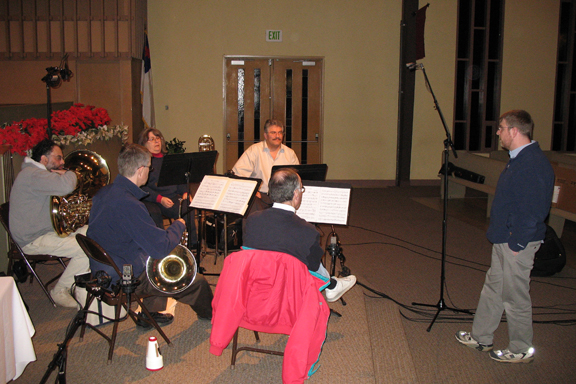|
World Premiere
performed May 7, 2006
Composer: John Blakelock
Download  Tribute to Johannes Brahms as an MP3 (6.7 MB) Tribute to Johannes Brahms as an MP3 (6.7 MB)
John Blakelock was born in San Diego. His
father was in the Navy and as a result, his family moved many times
while John was young. When he was two years old, his family moved to
Treasure Island and then later, to Concord. When John was four, his
family left California and eventually settled in Maryland. He spent
most of his life in a rural part of Maryland known as the “Eastern
Shore,” between the Chesapeake Bay and the Atlantic Ocean. He first
took composition lessons at Washington College in Chestertown,
Maryland, and went on to receive a B.A. in music. Later, he attended
The Catholic University of America in Washington D.C. and received a
Master’s degree in composition. John Blakelock currently resides in
Berkeley.
In addition to his skills as a composer,
John played the euphonium. John tells us that he originally wrote this
“Tribute to Johannes Brahms” for his undergraduate senior thesis
recital. As a euphonium player, he was familiar with the instruments
and the sound of a brass quintet, and writing for this ensemble seemed
like a natural choice. John had been exposed to Brahms’ Symphonies in
his undergraduate studies and had great admiration for them;
especially the 3rd and the 4th symphonies.
John was struck by Brahms’ use of a
diminished seventh chord in the beginning of his 3rd symphony. A seventh chord is a chord consisting of a triad plus a note forming an interval of a seventh above the chord's root.
In its earliest usage, the seventh was introduced solely as an embellishing or non-chord tone. The seventh destabilized the triad, and allowed the composer to
emphasize movement in a given direction. As time progressed and the
collective ears of the western world became more accustomed to dissonance,
the seventh was allowed to become a part of the chord itself, and in
some modern music, and jazz in particular, nearly every chord is a
seventh chord. A diminished seventh has a double-flatted seventh,
making it the same as a major sixth (root, minor third, diminished
fifth (tritone), diminished seventh (sixth)).
John decided to start his composition in a
similar fashion to Brahms, basing much of the harmonic and melodic
content in the piece around the diminished seventh chord. One of the
ideas John wanted to try in this piece was the possibility
of transforming the sound of a diminished seventh — from something
that passes on and resolves — to something in itself. Another aspect
of Brahms’ music that John wanted to emulate was the use of
counterpoint, and the importance of interior lines in his music. John
wanted to write a piece where every voice has equal importance.
Since his undergraduate days, John has
revisited the composition several times and has made considerable
changes, but the formal concept of the piece and the melodies remain
the same.
John contacted the Menlo Brass about having
us record “Tribute to Johannes Brahms” for his composition
portfolio, as part of his future application to doctoral programs. The
Menlo Brass made that recording on February 14, 2006. Click on the
link below to download the MP3 file.
The Menlo Brass was pleased to present the
World Premiere Performance of “Tribute to Johannes Brahms” by John
Blakelock on 5/7/06.
Dear Menlo Brass Quintet,
Here is the final
version of “Tribute to Johannes Brahms.” I am very pleased with the
outcome. I want to thank you all again for your openness and
willingness towards me and my music. I enjoyed working with the group
and regard your performance of my piece a gift. All the best.
Sincerely,
John Blakelock
Download  Tribute to Johannes Brahms as an MP3 (6.7 MB) Tribute to Johannes Brahms as an MP3 (6.7 MB)
 |